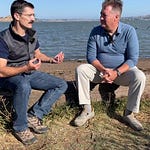I went to SLAS this spring to talk to old friends, meet some new ones and learn whatever I could. I met Maggie Vantangoli, the Director of Marketing at Araceli Biosciences in their booth where we chatted about the use of artificial intelligence (AI) for high content analysis (HCA) in drug discovery and development.
She was kind enough to join me on this podcast and fill in the (large) holes in my knowledge of cell biology. HCA is basically automated microscopy and analysis of fluorescently-stained (or otherwise) cells to identify changes caused by various compounds. This rich phenotypic information can provide valuable insights into how a drug or compound might work or whether it could be toxic.
You can listen to the podcast to learn about how HCA is used to group compounds based on the morphological changes in cells exposed to them.
A few things stood out for me. In terms of AI, the most interesting application was that of unsupervised learning, where the AI can learn to detect patterns that a human might not look for or even see if they were looking. One can imagine that a lot of information about biology could be uncovered aside from evaluating potential therapies.
When I asked about where HCA might go in the future, Maggie talked about doing tests on organoids as a replacement for animal models. This is a topic that has come up in a few of my conversations lately on and off this podcast.
I also asked Maggie what she thought about the possibilities for combining HCA with DoE (Design of Experiments) that I featured a few episodes back. Thankfully, she listened to that episode. (You should too.)
I definitely think there are amazing applications here and you know, I think it's a massive amount of untapped potential, particularly in that high content space.
I know that different aspects of drug discovery are getting there, particularly like the structure-activity type relationships. But I think this is a completely untapped market for the DoE type of type of work and there's huge amounts of applications because high content's also, you know, per assay, like most assays in drug discovery, there's cost associated there and that's not... When you're scaling up, that is not in insignificant amounts of money. So running millions or even tens of thousands of compounds a day with staining and all the liquid handling and tips and all of that is, is quite expensive. The amount put into that one little plate is extremely expensive.
So you can kind of do your work ahead of time and, and utilize the Design of Experiments to stack the deck in your favor.
Sorry to interrupt here, but you are subscribed aren’t you?
I get a special joy out of when two episodes connect in that way. I’m going to see if we can get Maggie to come back with Markus to discuss the possibilities.
I’d love to hear what you think of this episode or the podcast overall. Feel free to drop a comment.
Also, if you want to talk about custom content for your life science brand, let’s chat.











